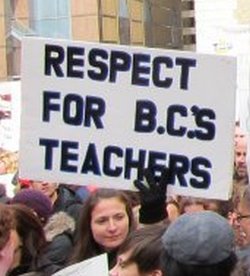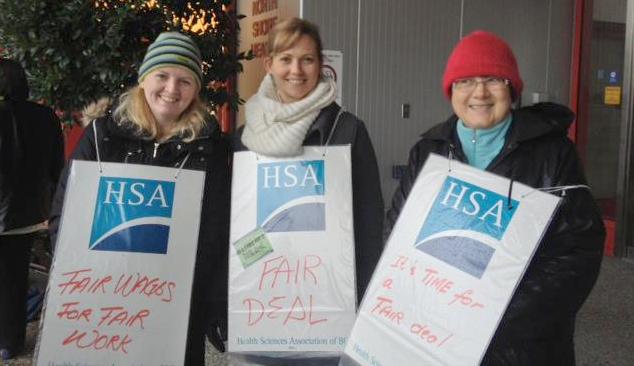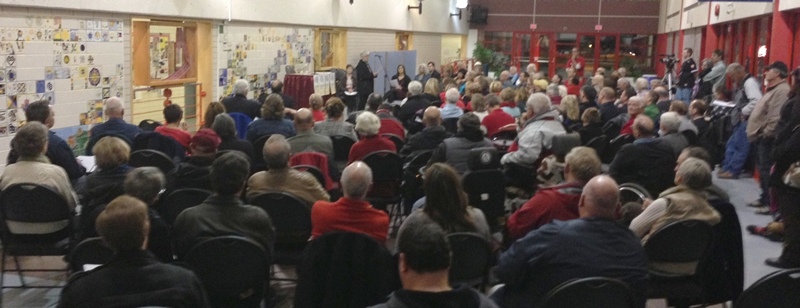
|
November 26, 2012 - No. 149 British Columbia Provincial Federation of Labour
Convention
|
 Vancouver protest against planned closure of Coast Guard station, September 15, 2012. |
The past ten years of neo-liberal rule in BC and Canada have opened the eyes of many workers to the necessity to unite and organize to use their overwhelming strength of numbers and progressive social consciousness to defeat the assault on their rights and on the public institutions, authority and control of the decision-making process on which every modern society depends for its security and well-being. This entails an organized fight for a new direction for the economy with a human-centred focus such that the human and natural resources of the province are developed both to meet the needs of a new nation-building project of the Canadian working class and to participate in international trade for mutual benefit not domination. To do so requires that the working class act as an organized force, armed with its own independent politics and modern definitions of governance where those who produce the wealth and provide the services essential to a modern society participate consciously and actively in setting agendas and in making the decisions that affect their lives and the general interests of society.
The BC working class, with its own thinking and
independent organizing can break new ground; it has the capacity to
deprive the ruling elites of their power to deprive the people of their
right to chart a new direction for the economy that favours them and to
create new political arrangements that open up an
era of the empowerment of the people.









Health Care Workers Complete Strike Votes

Health care workers on strike at North Shore Health, November 23, 2012.
 In November, the last two
major groups of health care
workers in BC completed strike votes in support of their contract
demands. The 90 per cent strike vote of the Health Sciences Association
(HSA), the bulk of which are hospital pharmacists, radiology, lab and
medical technicians, completes the results. Earlier
in the month, a 96 per cent strike vote of workers in the Facilities
Bargaining Association was announced, which represents workers in
hospitals and seniors' residences designated "support staff" covering
everyone except Registered Nurses,
some Licensed practical nurses and
the HSA. The 96 per cent vote in favour
of a strike followed a report from the bargaining committee that in
more than eight months of talks the employer had agreed to no wage or
other
improvements and was continuing to demand concessions including an
agreement that workers would pay 25 per cent of the benefit premiums
for health and dental care. The firm
position of the workers going into bargaining was that under no
circumstances would they accept any reduction in benefits. The vote was
a reaffirmation of that stand.
In November, the last two
major groups of health care
workers in BC completed strike votes in support of their contract
demands. The 90 per cent strike vote of the Health Sciences Association
(HSA), the bulk of which are hospital pharmacists, radiology, lab and
medical technicians, completes the results. Earlier
in the month, a 96 per cent strike vote of workers in the Facilities
Bargaining Association was announced, which represents workers in
hospitals and seniors' residences designated "support staff" covering
everyone except Registered Nurses,
some Licensed practical nurses and
the HSA. The 96 per cent vote in favour
of a strike followed a report from the bargaining committee that in
more than eight months of talks the employer had agreed to no wage or
other
improvements and was continuing to demand concessions including an
agreement that workers would pay 25 per cent of the benefit premiums
for health and dental care. The firm
position of the workers going into bargaining was that under no
circumstances would they accept any reduction in benefits. The vote was
a reaffirmation of that stand.
Under BC legislation, a 72-hour strike notice is required. All health care workers in the province except Registered Nurses and Registered Psychiatric Nurses whose contract was settled earlier in the fall, are now engaged in job actions of one form or another, or in a position to give notice.
Well-Attended Prince George Community Conversation

On Tuesday, November 13, concerned community residents and civic workers in Prince George organized a "community conversation" meeting at the College of New Caledonia (CNC) in which over 250 people participated. The purpose of the meeting was to create a forum where residents, from all walks of life and points of view, could discuss and share their thoughts on which direction they would like the city to go in terms of its services and operations.
This community conversation -- sponsored by I Heart PG, the Stand Up for the North Committee, and the Faculty Association of CNC -- was organized in the wake of a recently completed "Core Services Review" in the city. This review was commissioned by Prince George City Council and carried out by KPMG, one of the "big four" global consulting multinationals, for a total cost of about $350,000.
According to the terms of reference established by City Council, the purpose of the six month Review was "to examine the services provided by the City of Prince George and offer recommendations concerning program/service mandates, opportunities for expense reduction and revenue diversification, and operational efficiency."
KPMG's final report, which was released earlier in November, contains 32 "opportunities" for Prince George city council to consider implementing in the near future. An additional 67 "opportunities" are to be considered for later implementation or further investigation, along with 9 other recommendations listed in a confidential document having to do with labour and employee relations.
The 32 "opportunities" that are now on the table for Council to consider include recommendations to sell off or privatize a number of city assets and property (including the Civic Centre, Four Seasons swimming pool and golf course) as well as contract out certain municipal operations, such as parking by-law enforcement and waste disposal.
In addition, KPMG recommends jacking up user fees for the city's aquatic centres, baseball and soccer fields, hockey rinks, parks and other services, along with the removal of rental subsidies and tax exemptions for some non-profit and charitable organizations.
KPMG's final report has caused concern within a broad section of the Prince George community. Citizens were already concerned about various aspects of the core services review process conducted by KPMG, including the planting of privatization ideas by KPMG facilitators in the "public input" sessions, a badly constructed and user "unfriendly" survey, an inflated participant count, the high cost of the review compared to other cities, and so on.
As well, many citizens were concerned about the fact that KPMG is not a neutral or independent organization, but rather a global multinational closely connected with brokering and facilitating neo-liberal schemes that favour the international financial oligarchy, including the privatization of public services, ramping up of user fees, and corporate tax avoidance.
In response to these concerns, I Heart PG (which was initiated by CUPE locals at the city), Stand Up for the North Committee and Faculty Association of CNC called for a "community conversation" meeting on November 13 to discuss the final report and allow for citizens to directly address city council members without the mediation of KPMG.
City Councillors Brian Skakun, Garth Frizzell, and Frank Everitt agreed to attend the community conversation meeting. However, Mayor Shari Green and 5 other councillors declined the invitation.
Initially, they used the argument that if a majority of council showed up at the community conversation meeting all at once that this could be legally construed as a "quorum" and thus an official council meeting.
When it was pointed out to them that the entire council regularly met with the Chamber of Commerce and other organizations, and that constituting a council quorum in such venues had not been an issue before, their argument shifted to claiming that there had already been ample public input into earlier stages of the core services review. In so doing, the mayor and council avoided the fact that there had been no public input as of yet into the final report itself.
Despite the mayor and some of the councillors refusing to attend, I Heart PG and the other sponsoring groups went enthusiastically ahead with the organizing of the community conversation, contacting hundreds of organizations and individuals through phone calls and social media, putting up posters around the town, and running ads.
The aim of the "community conversation" was to allow as many city residents to speak as possible. Thus, a moderator was appointed, and individuals were given approximately two minutes to present their views, not just limited to the framework of KPMG's final report, but also on how they saw moving the city forward in broader ways in terms of its services and operations.
Over 30 people gave presentations, either as individuals or as representatives of organizations. They included parents whose children used sports and recreation facilities, non-profit and charitable organizations, civic workers, educators, community activists, former civic politicians, and religious groups.
All of the speakers, in one way or another, were critical of KPMG's recommendations and its overall direction in advocating for increased privatization and outsourcing, raising user fees and eliminating rental subsidies and tax exemptions. They underlined the importance of accessible sports and recreation activities in the culture and life of the city, as well as the huge contributions of the non-profit and charitable sectors. In that regard, a number of people made a point of criticizing KPMG's narrow view on the value these services and sectors provide to the city as a whole.
Other presenters expressed concerns about the city's debt levels, as well as the difficulty in citizens exerting control over council decisions, especially to do with mega-projects of various kinds. Still others talked about the importance of maintaining public sector facilities and jobs, and the importance of these to the city's economy and life.
One of the lessons coming out of this community conversation is that residents of Prince George are clearly not satisfied with the KPMG multinational setting the frame of reference for discussion on improving city services and operations. Another important lesson is that citizens clearly want more say in civic affairs and the overall direction of the city, and they want better mechanisms than KPMG's core services review to accomplish this.
To that end, organizers of the event are planning more meetings and activities, including the holding of community forums in the new year and further lobbying of city council members regarding KPMG's "recommendations."
Read The Marxist-Leninist
Daily
Website: www.cpcml.ca
Email: editor@cpcml.ca



 Workers in BC are waging
battles on many fronts to defend their rights to wages and benefits,
including pensions that have been won over many years and to defeat
attempts to create a disorganized two-tier workforce. The working class
is also fighting against a broad wrecking of industry and the sell-off
of
publicly controlled resources like BC Hydro alongside the destruction
of public health care and education.
Workers in BC are waging
battles on many fronts to defend their rights to wages and benefits,
including pensions that have been won over many years and to defeat
attempts to create a disorganized two-tier workforce. The working class
is also fighting against a broad wrecking of industry and the sell-off
of
publicly controlled resources like BC Hydro alongside the destruction
of public health care and education. The BC Federation of Labour
in recent years has stepped up its work on various fronts. The
Convention will hear reports from eight standing committees --
Apprenticeship, Community Social Action, Education, Human Rights,
Occupational Health and Safety, Political Action, Women's Rights and
Young Workers.
Over 200 resolutions related to these reports and others initiated by
union locals throughout the province, along with elections for
President and Secretary will take place during the convention. Various
guest speakers will address the Convention; Young Workers and Women's
Committees and others are holding workshops
and a Migrant Workers Solidarity Evening is organized.
The BC Federation of Labour
in recent years has stepped up its work on various fronts. The
Convention will hear reports from eight standing committees --
Apprenticeship, Community Social Action, Education, Human Rights,
Occupational Health and Safety, Political Action, Women's Rights and
Young Workers.
Over 200 resolutions related to these reports and others initiated by
union locals throughout the province, along with elections for
President and Secretary will take place during the convention. Various
guest speakers will address the Convention; Young Workers and Women's
Committees and others are holding workshops
and a Migrant Workers Solidarity Evening is organized. Growing numbers of workers
recognize that they have the social responsibility to mobilize and
organize their fellow workers and their allies for actions with
analysis to defend their interests and importantly with their own
outlook, agenda and voice. No one from the political elite of the
ruling class is going to
defend them or the public interest. The trained political elites in
this
province serve the private interests of the global monopolies and
developers; they know no other master. Workers themselves have to learn
the politics and theory of class struggle through conscious
participation in the organized movement to defend
their economic, political and social rights. An important aspect of
this challenge is the need to renew their organizations, including the
trade unions, so they can withstand not only the constant physical
attacks on their rights by employers and the ruling elite but also the
mental and theoretical abuse that constantly
wants to divert workers from their own thinking, outlook and agenda,
belittle them and their dignity and try to convince them that they are
not capable of building on their own a new human-centred society.
Growing numbers of workers
recognize that they have the social responsibility to mobilize and
organize their fellow workers and their allies for actions with
analysis to defend their interests and importantly with their own
outlook, agenda and voice. No one from the political elite of the
ruling class is going to
defend them or the public interest. The trained political elites in
this
province serve the private interests of the global monopolies and
developers; they know no other master. Workers themselves have to learn
the politics and theory of class struggle through conscious
participation in the organized movement to defend
their economic, political and social rights. An important aspect of
this challenge is the need to renew their organizations, including the
trade unions, so they can withstand not only the constant physical
attacks on their rights by employers and the ruling elite but also the
mental and theoretical abuse that constantly
wants to divert workers from their own thinking, outlook and agenda,
belittle them and their dignity and try to convince them that they are
not capable of building on their own a new human-centred society.